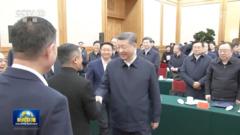**Jack Ma’s recent appearance alongside Xi Jinping hints at potential shifts in government policy towards the tech sector, stirring investor enthusiasm and economic hopes.**
**Jack Ma's Comeback: A New Era for China's Tech Industry?**

**Jack Ma's Comeback: A New Era for China's Tech Industry?**
**The return of Alibaba’s founder sparks optimism and speculation about the future of technology in China.**
In a significant development for China's tech landscape, former Alibaba founder Jack Ma was seen at a high-profile meeting with President Xi Jinping, igniting renewed interest and cautiously optimistic discussions about the future prosperity of the country's tech industry. Ma, who distanced himself from public life after criticizing China's financial sector in 2020, was photographed among other influential figures, marking a moment of potential rehabilitation.
Analysts and observers took note of Ma’s prominent seat at the symposium and interpreted it as a signal of possible policy shifts towards a friendlier approach for the tech sector. "Jack Ma's presence, even without a speaking role, suggests a significant softening of Beijing's stance," stated Bill Bishop, a noted China analyst. The broader market responded positively, with tech stocks, particularly Alibaba, experiencing significant gains following the event.
Social media buzzed with affirmations about Ma’s return, with users on Weibo celebrating what they termed a much-needed economic boost. Ma’s re-emergence serves as a reminder of his pivotal role in the tech industry before his criticism of state-owned banks led to a drastic retreat from the public eye, including the cancellation of an anticipated $34.5 billion IPO for Ant Group.
Industry leaders are now speculating about the implications of Xi Jinping's statement during the meeting emphasizing the need for innovation and growth amidst economic challenges. This rhetoric signals potential leniency, hinting that the government might be re-evaluating its approach after a prolonged crackdown that has stifled tech growth in recent years.
Moreover, the enthusiasm surrounding the arrival of DeepSeek's advanced AI model has reignited interest in fostering innovation and investment within Chinese tech firms. The recent surge in Chinese stocks illustrates this new wave of optimism, with experts noting that significant investment might be drawn towards tech companies as the sector aligns with state interests.
While Ma's return is seen as a positive indicator, experts caution that it may not indicate a complete return to a pre-2020 status quo. Some believe that the government is shifting from strict oversight to a form of controlled engagement with the private sector. Mareen Zhang, an associate professor at the University of Technology Sydney, articulated this sentiment by suggesting that Beijing now seeks alignment between tech innovation and national priorities—a move intended to steer China towards self-reliance and strategic technological advancement.
The implications of Jack Ma's return stretch beyond the individual; they hint at a broader recalibration within Chinese policymaking, focusing on high-quality development and strategic industries to achieve ambitious modernization goals. As the nation grapples with international pressures, the need for a robust private sector that resonates with government priorities has never been more apparent.
Analysts and observers took note of Ma’s prominent seat at the symposium and interpreted it as a signal of possible policy shifts towards a friendlier approach for the tech sector. "Jack Ma's presence, even without a speaking role, suggests a significant softening of Beijing's stance," stated Bill Bishop, a noted China analyst. The broader market responded positively, with tech stocks, particularly Alibaba, experiencing significant gains following the event.
Social media buzzed with affirmations about Ma’s return, with users on Weibo celebrating what they termed a much-needed economic boost. Ma’s re-emergence serves as a reminder of his pivotal role in the tech industry before his criticism of state-owned banks led to a drastic retreat from the public eye, including the cancellation of an anticipated $34.5 billion IPO for Ant Group.
Industry leaders are now speculating about the implications of Xi Jinping's statement during the meeting emphasizing the need for innovation and growth amidst economic challenges. This rhetoric signals potential leniency, hinting that the government might be re-evaluating its approach after a prolonged crackdown that has stifled tech growth in recent years.
Moreover, the enthusiasm surrounding the arrival of DeepSeek's advanced AI model has reignited interest in fostering innovation and investment within Chinese tech firms. The recent surge in Chinese stocks illustrates this new wave of optimism, with experts noting that significant investment might be drawn towards tech companies as the sector aligns with state interests.
While Ma's return is seen as a positive indicator, experts caution that it may not indicate a complete return to a pre-2020 status quo. Some believe that the government is shifting from strict oversight to a form of controlled engagement with the private sector. Mareen Zhang, an associate professor at the University of Technology Sydney, articulated this sentiment by suggesting that Beijing now seeks alignment between tech innovation and national priorities—a move intended to steer China towards self-reliance and strategic technological advancement.
The implications of Jack Ma's return stretch beyond the individual; they hint at a broader recalibration within Chinese policymaking, focusing on high-quality development and strategic industries to achieve ambitious modernization goals. As the nation grapples with international pressures, the need for a robust private sector that resonates with government priorities has never been more apparent.





















